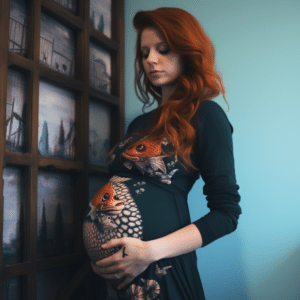
Why Is My 13 Weeks Pregnant Belly Soft?
13 Weeks Pregnant Belly Is Still Soft: Pregnancy is a beautiful journey full of ups and downs. The first trimester is usually one of the hardest for most women. Morning sickness, frequent urination, back pain, extreme fatigue, food aversions, and severe cravings can make pregnant women’s lives rollercoasters. But as the day goes by and you enter trimester two, the symptoms lessen and may end altogether for most moms.
The second trimester is fun, with many milestones defining pregnancy happening, including feeling baby movements. Your baby bump will also start showing around this time, and your stomach will feel stiffer and firmer.
But what happens if your belly is still soft? Is that normal, or there’s a cause for concern? Stay tuned to learn more about why your stomach is still soft at 13 weeks pregnant.

Reasons Why 13 Weeks Pregnant Belly Is Still Soft
At 13 weeks pregnant, your baby is still tiny, and your uterus is midway between your pubic bone and the umbilicus, making the rest of your abdomen feel soft. And the more your fetus grows, the more the uterus expands and extends towards your belly, making it feel firm.
You’ll likely feel your belly becoming hard around the halfway mark of your pregnancy. According to Dr. Jennie Mao, MD, a medical doctor at the UW Medicine Women’s Clinic at Harborview Medical Center in Seattle, your uterus will be felt about the 20th week of pregnancy at the belly button. The uterus will continue to extend higher as the pregnancy continues.
Put simply, your belly will stop feeling soft and be firm around this time. Dr. Kecia Gaither, MD, MPH, FACOG, says as the fetus keeps growing, the hard part of your belly will extend upwards as the uterus grows, putting pressure against the skin. Note that firmness comes from the pressure of the contents inside the uterus (baby), not the uterus itself, which is softened by pregnancy hormones.
Changes That Occur At 13 Weeks Pregnant
At 13 weeks, you are in the final days of your first trimester and nearing the second trimester. Here are some of the changes you should expect during this time:
Increase In Hormones
During the second trimester, your hormone levels increase as the placenta takes over production. Before this (in the first trimester), the ovaries produced hormones needed to sustain the pregnancy. But as you enter trimester two, they cease to do so, and the placenta is now responsible for maintaining the pregnancy.
Your Baby
By this time, your baby has grown to about the size of a peapod. Your baby’s intestines growing in the umbilical cord are returning to the abdomen. Tissue around your little one’s arms, head, and legs slowly fortify into the bone. Your baby has also started urinating in the amniotic fluid, and most of the fluid in the uterus will now be your kid’s urine until the end of your pregnancy.
In the next couple of weeks (17 to 20 weeks), you’ll likely be able to identify your baby’s sex through an ultrasound. And if you have a prenatal appointment, you should hear your little one’s heartbeat through a Doppler machine.
Twin Development At 13 Weeks
At the end of this week, you’ll have reached the second trimester; congratulations! This week your babies will be almost 4 inches, each weighing just over an ounce. Tissue that will ultimately become bone and legs around your twins’ heads is also forming this week. Your twin has also begun urinating in the amniotic fluid surrounding them.
Pregnancy Symptoms At 13 Weeks
Your earlier symptoms will begin to fade, and you may find yourself in a relaxed state before fully entering your second trimester. If you’re still exhausted or have nausea, look forward to diminishing symptoms in the following weeks. Some pregnancy symptoms that you’ll experience at 13 weeks include:
More Energy
Forget the exhaustion of the first trimester; you should begin feeling more energetic during this time. Some people call this increase in energy the “honeymoon period” of pregnancy as most symptoms fade. And before you know it, you’ll be in your third trimester experiencing new symptoms like restless sleep and swollen ankles.
Leaky Breasts
Besides your belly, your breasts are also changing. And as early as the second trimester, you’ll begin producing colostrum, a thick and sticky light orange or yellow precursor to breast milk. You may also notice your breasts leaking from time to time, which is normal during pregnancy unless you have pain or discomfort.
Round Ligament Pain
As the pregnancy progresses, your uterus continues to grow rapidly, and you should be able to feel your uterus at the top of it above the pelvic bone. The continuous uterus growth may cause you to experience sharp lower abdominal pains called round ligament pain anytime you shift positions or get up too quickly. In most cases, this pain is not a symptom of something serious. However, talk to your doctor if you experience pain coupled with fever, bleeding, or chills.
What You Can Do This Week To Have A Healthy Pregnancy
It’s still not late to eat healthy foods that nourish your body and baby. Focus on whole foods with lots of minerals, vitamins, and good fats. Whole-grain toast with peanut butter is a good way of starting your day. Fruits rich in antioxidants are also great. Remember to include eggs, beans, and lean meat in your diet. Avoid:
- Seafood rich in mercury.
- Undercooked meats and seafood.
- Unpasteurized foods like soft cheese.
- Raw eggs.
- Alcohol and caffeine.
- Some herbal teas.
- Unwashed vegetables and fruits.
- Unheated lunch meats.
Exercise is also helpful in ensuring safe delivery and quick healing. Swimming, walking, yoga, jogging, and lifting are all great. Avoid abdominal exercises like situps or those requiring you to lie on your back and focus more on pelvic and core strengthening exercises.

Conclusion
13 Weeks Pregnant Belly Is Still Soft: Don’t be worried if you are 13 weeks pregnant and your belly is still soft. That’s normal as your uterus hasn’t extended to the abdomen; it’s still somewhere between the pelvic bone and the umbilicus. Around 20th weeks into your pregnancy, your uterus would have reached the umbilical, making your stomach firm.